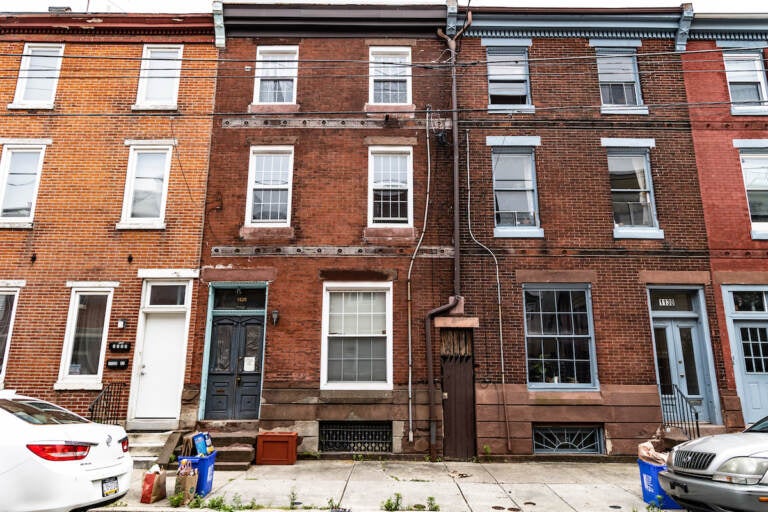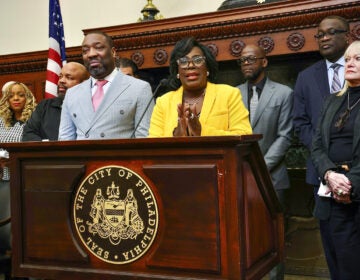Philly legislation would cut red tape for affordable housing projects, reduce up-front rental costs
The legislation is part of a broader effort to increase the city’s supply of affordable housing while blunting the financial burden of renting a new place.
Listen 1:20
Rowhouses in Philadelphia’s Spring Garden neighborhood. (Kimberly Paynter/WHYY)
Have a question about Philly’s neighborhoods or the systems that shape them? PlanPhilly reporters want to hear from you! Ask us a question or send us a story idea you think we should cover.
Philadelphia lawmakers have advanced legislation designed to fast-track the approvals process for affordable housing projects with long-term income restrictions.
The measure, passed out of committee on Tuesday, is part of a broader effort to increase the city’s supply of affordable housing by reducing the amount of red tape developers must get through before construction can start.
The bill moves forward as City Council considers the mayor’s proposal to create and preserve 30,000 units of housing over four years, a multifaceted initiative formulated in response to the city’s affordable housing crisis.
“If we’re serious about ending our city’s affordable housing crisis, and making government part of the solution, we need to turn over every stone and identify ways we can do things differently to get families into safe, stable and affordable housing sooner,” said Councilmember Jamie Gauthier, who chairs council’s Committee on Housing, Neighborhood Development and the Homeless.
Under the legislation, the city’s Department of Licenses and Inspections would be required to expedite the review process for zoning permit applications for these developments. Instead of taking 10 business days, the turnaround time would be cut in half, to five business days.
The department would additionally be required to review building permit applications for these projects on an expedited timeline of 10 business days.
Another provision seeks to make operational changes to the Zoning Board of Adjustment, an independent board empowered to make legally binding decisions about what proposed developments get built.
Gauthier wants these affordable housing projects, which routinely need variances, to get hearing dates sooner, at no additional cost.
It can take up to six months to secure a time slot on the zoning board’s regular schedule. Projects on its expedited list are typically scheduled one or two months sooner, according to a city spokesperson.
An expedited hearing costs $750 per property, with a maximum cost of $2,250, according to the city..
“Now is the time to show developers willing to build deed-restricted affordable housing that we appreciate them and prioritize them,” Gauthier said.
Reducing up-front rental costs
The legislation moves forward despite concerns from the city’s Department of Planning and Development and the Department of Licenses and Inspections.
Kathleen Grady, a deputy director with Planning and Development, told lawmakers the legislation could reduce the amount of time developers save by paying for an accelerated hearing date, because more projects will be added to that schedule if the bill becomes law.
At the moment, the zoning board typically hears zoning appeals during five all-day hearings each month.
“While we don’t know exactly how the bill would affect the timing of accelerated appeals, it’s important for the committee to understand this trade-off, since it will affect all ZBA appellants,” Grady said during Tuesday’s committee hearing.
She added that her department has already implemented a plan designed to improve the time it takes for developers to move through the zoning board process. The department, for example, hopes to get the board to a place where it issues decisions two weeks after a hearing.
Alexander Palmer, director of enforcement for L&I, testified that the legislation would be challenging and costly to implement because, similar to many city departments, the agency remains understaffed.
He estimated the department would need to spend an additional $210,000 on overtime each year to meet the bill’s requirements.
“Furthermore, the quality of these reviews would suffer, which could have dramatic impacts on life, safety and the general quality of owners of adjoining parcels,” Palmer said.
Lawmakers pushed back, including Councilmember Cindy Bass, who called the concerns “a little bit shortsighted” given the great need for affordable housing in Philadelphia.
“It almost feels like sometimes we get in our own way. We wanna fix a problem, but we don’t want to put the work in to fix the problem. And we just have to,” Bass said.
Lawmakers on Tuesday also advanced legislation designed to reduce the financial burden of moving into a new apartment, particularly for the thousands of cost-burdened tenants who spend more than 30% of their income on rent.
The committee approved two bills as part of Councilmember Rue Landau’s Move-In Affordability Plan.
One measure caps rental application fees, including background and credit checks, so they cannot exceed $50.
The other bill enables residents to pay their security deposit in installments if the amount is equal to two monthly payments, the maximum under state law. If a renter chooses the payment plan, they would be required to put down the first month’s rent and half of the security deposit up front. The other half would be paid over the next three months, on top of the rent due for each of those months.
Housing advocates and tenants applauded the legislation, saying it would ease the stress of finding and moving into a new apartment, especially given that application fees are generally nonrefundable, and that tenants do not always get their full security deposit back from their previous landlord.
“All of these often substantial costs increase renter uncertainty and decrease the accessibility of rental housing in the city,” said Brewerytown resident Miles Owen, a city planner who has rented in Philadelphia for a decade.
Landlords who testified Tuesday said putting a tenant on a payment plan for their security deposit would only add to their financial risk, especially if they have to file for an eviction because a tenant has stopped paying rent, a process that can take six months to complete.
Ryan Spak, founder of the Spak Group, said the cumulative financial loss during that stretch eats into what can be a thin profit margin on a given unit.
“The challenge is when all these things stack on top of each other individually, it becomes untenable,” said Spak, who supports capping application fees.
Council must now take a final vote on all three measures approved Tuesday. It could happen as early as next week.

Get daily updates from WHYY News!
WHYY is your source for fact-based, in-depth journalism and information. As a nonprofit organization, we rely on financial support from readers like you. Please give today.







